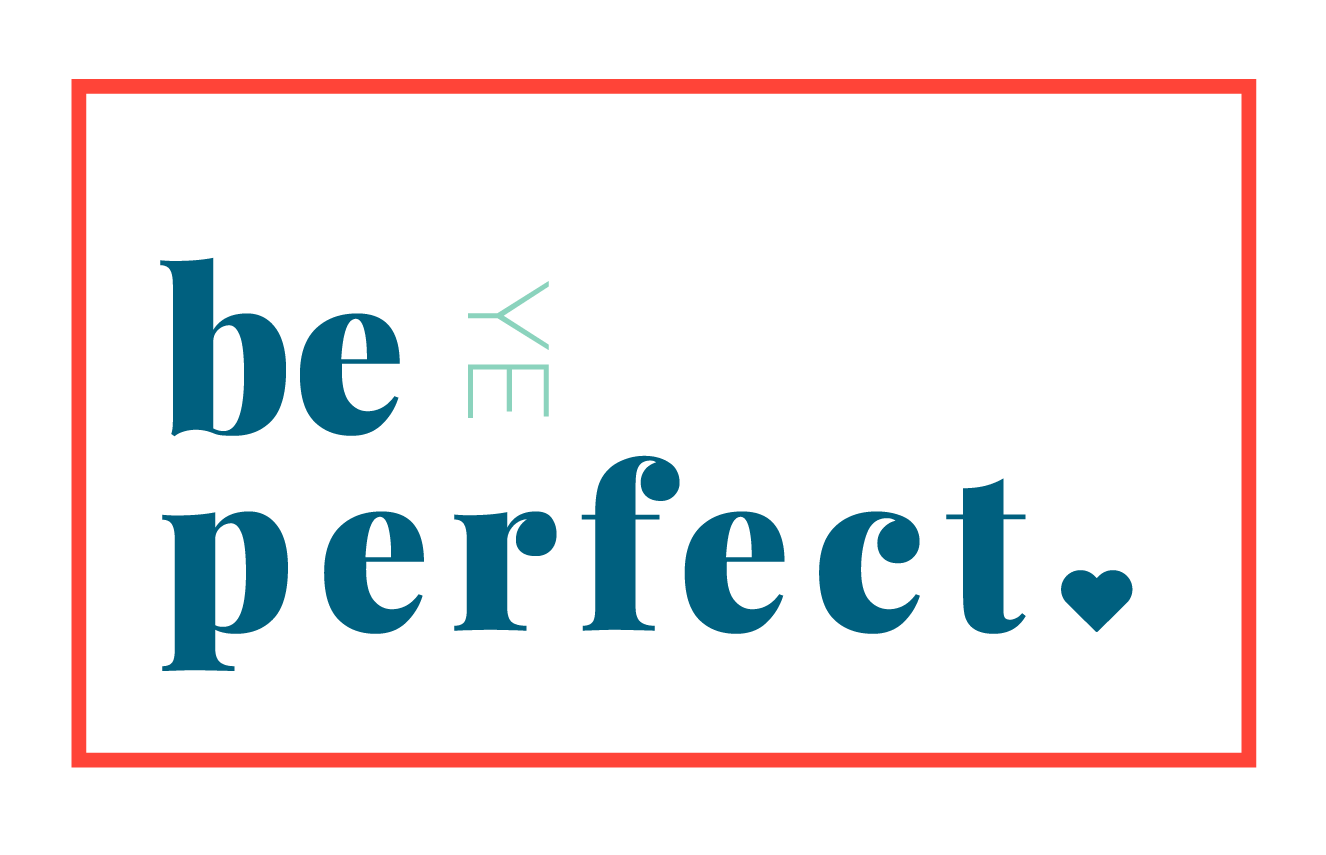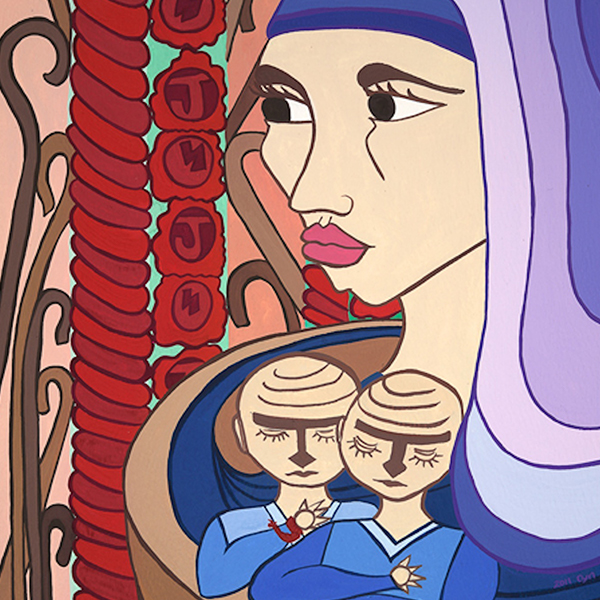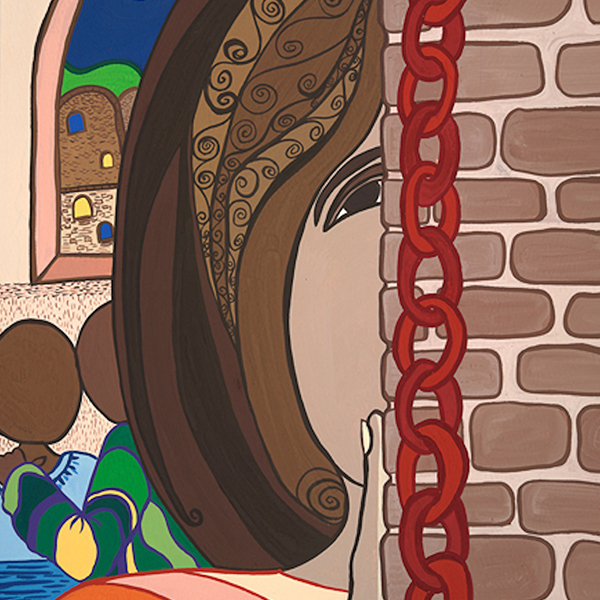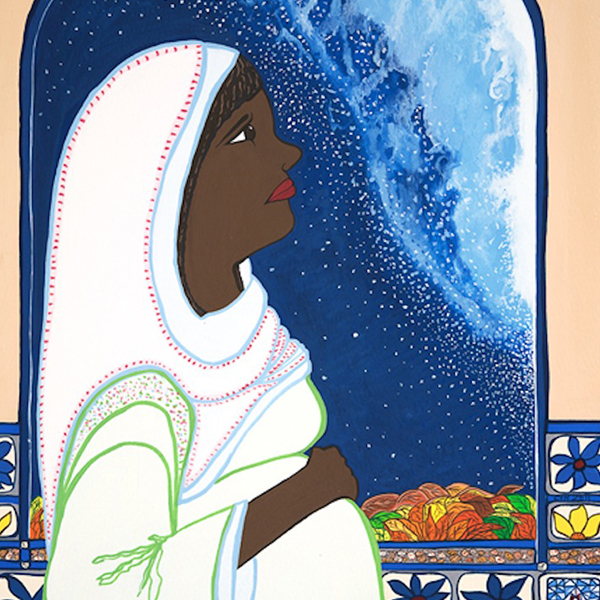Refuge Under His Wings
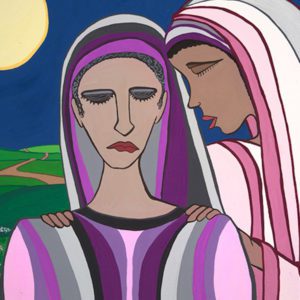
It would be quite the stretch of the imagination to call the first two out-of-place ornaments on Jesus’ family tree, Tamar and Rahab, “upright and moral women.” One acted like a prostitute, and the other was one. Both were the kind of women one might happen to skip over when trying to make a family tree look good. In stark contrast, the third woman in Jesus' family tree, Ruth, was highly esteemed by all. Yet, her story too, is a story of a life wrecked and redeemed. She too was a sinner in need of a Savior.
How did Ruth, another foreign gentile, find her way into Jesus’ lineage of grace? What does her story mean for us? Let’s go to the little town Bethlehem during the time of the Judges and find out.
Ruth—Chapter 1
No Bread in Bethlehem
Ruth’s chronicle begins with a woman named Naomi and her husband Elimelech, who have made the difficult decision to abandon their land, lives, and loved ones in Bethlehem. The reason they deserted Bethlehem was simple: Stay and starve or sojourn and survive.
Bethlehem, which ironically means “the house of bread,” at that time “had no bread.” There was a great famine in the whole land. So, Naomi and Elimelech took their two sons, Mahlon and Chilion, and made their way around the sea to the land of Moab. (Ruth 1:1-4)
The people of Israel did not normally undertake a journey to Moab. The neighboring Moabites traced their lineage back to Abraham’s nephew, Lot, and the incestuous relationship he had with his daughter.
The Moabites, however, were enemies of Israel, and according to the laws given to Moses, they were to be excluded from the worship life of Israel for ten generations (which this time included). But because they had nowhere else to turn, Naomi, Elimelech, and their two sons sojourned there.
No Easy Choices
What happened when these immigrants first stepped foot in Moab is unknown, but after they had lived there for several years, Elimelech died. Because the famine in Bethlehem persisted, Naomi and her sons remained in Moab rather than return to home and family. Eventually, going against both law and custom, Mahlon and Chilion wed Moabite women named Orpah and Ruth.
Although Naomi grieved for Elimelech and her life back in Bethlehem, she must have been enthusiastic for her son’s marriages to these two young ladies. In them was the possibility of grandchildren who would fill her with joy and who could continue her dead husband’s line.
But those prospects and that line came to a quick end. After the displaced family had been in Moab for about ten years, Naomi’s two sons also died; her daughters-in-law were still childless.
No Prospects
Empty beds, empty wombs, and empty shelves left women in that day helpless and hopeless. One widow might endure on her own for a while, two perhaps could make do somehow, but survival for three living together would be economically impossible.
To make matters worse, if they stayed together, their remarriage prospects were slim. One was old and a foreigner, and the other two, although young, were less desirable because of their marriages to foreign men and their relationship to the other two widows. When food was scarce, adding three extra mouths to feed to any family would have been futile. They would have to come up with a plan, or they were not going to last.
No Looking Back
After years of receiving only bad news, one day, Naomi finally received some good news. God had come to the aid of his people in Israel by providing them with food.
With Bethlehem again living up to its name, Naomi and her daughters-in-law quickly prepared to travel there. Bags packed and the journey just begun, Naomi stopped and said to them, “It will be better for you to return to your families than to continue with me. There is more for you here than there is in Bethlehem.”
At first, both refused, but eventually, Orpah reluctantly departed for home. Ruth, however, rejected Naomi’s pleading and said, “Where you go, I will go. Your people will be my people. Your God will be my God.” Placing her faith in the God of her people’s enemy, Ruth pledged her undying allegiance to Naomi.
No Longer Naomi
The two widows’ arrival in Bethlehem stirred up the whole small town. (Ruth 1:13-16) The years away had taken their toll on Naomi so much so that her people hardly recognized her. Naomi explained to them that she was not the same woman she was when she departed. Perhaps forgetting somehow the famine induced hunger pains she had endured, she exclaimed, “My name is no longer Naomi (which means pleasantness); rather call me Mara, because my life is very bitter. I went away full, but God has brought me back empty.”
With empty bitterness as her new identity, she blamed God for her misfortune and affliction. Little did Naomi/Mara know she was about to see the fullness of God poured out upon her and Ruth. But we get ahead of ourselves. (Ruth 1:19-22)
No Bread in Bethlehem, Again
Even though the two widows had arrived in Bethlehem at the barley harvest, their food problems persisted. Naomi still had her family’s land, but it was too late into the season for them to reap its benefits. Someone else would have been working it and therefore owned the harvest. Although the famine was over, and Naomi had returned to “the house of bread,” there was still no sustenance for her or Ruth. They had nothing to eat. They were poor and needy and empty again.
Ruth—Chapter 2
No Fear in the Fields
With no other options available, Ruth asked her mother-in-law for permission to glean in the fields. Gleaning was the equivalent of going to the Hebrew Food Bank or to a soup kitchen to get a bite to eat.
One of the laws God gave to Moses provided this means of welfare for exactly such a time and situation. But it wasn’t without its risks. It was very dangerous for her to venture out into the city as a young woman, all by herself, then to head out into the country and work in a strange man’s field with a bunch of guys she didn’t know. But Ruth trusted the Lord to provide and to fill her with his blessings.
Naomi granted permission, and Ruth headed out to a neighboring field. According to God’s faithful providence, she ended up in the field of a man named Boaz, who was Naomi’s relative, unbeknownst to her. Ruth began to glean among his workers and was working fervently when Boaz arrived. He asked who she was, and when he learned about her, he was impressed by her and her story. Boaz told Ruth that she would be welcome and safe in his field for as long as she needed to be there. He assured her that his men would treat her with respect. Then, he offered her the companionship of his women workers and even water from their jars. Boaz’s compassion and generosity overflowed.
No Quid Pro Quo
Ruth, so accustomed to futility, was overwhelmed by his kindness. She asked Boaz why he treated her so graciously, so abundantly. Boaz answered her,
“It hath fully been shewed me, all that thou hast done unto thy mother in law since the death of thine husband: and how thou hast left thy father and thy mother, and the land of thy nativity, and art come unto a people which thou knewest not heretofore. The Lord recompense thy work, and a full reward be given thee of the Lord God of Israel, under whose wings thou art come to trust.”
Ruth 2:10-12
When Ruth asks why he has shown such favor, Boaz does not answer, “Grace has no conditions.” He answers her question by saying,
“Thou hast left thy father and thy mother, and the land of thy nativity, and art come unto a people which thou knewest not heretofore.”
Does this mean that Boaz wants us to think of Ruth’s love for Naomi as a work that merits Boaz’s favor and the favor of God? Does he want us to think of grace as a kindness we must earn?
No. If Ruth earned Boaz’s favor, she would have been like an employee rendering valuable service to her employer for which he is indebted to repay her. That’s not the image Boaz’s words ought to create in our minds. This is not a quid pro quo, Ruth-did-good-so-she-got-good, kind of situation. There was something much bigger and more beautiful going on here than an employer and employee repayment relationship.
No Worry “Under His Wings”
Instead, in his reply, Boaz uses an image that makes the employer-employee quid pro quo idea impossible. God is really the one who is rewarding Ruth for her love for Naomi. Boaz is only a tool of God. Notice again his words, “The Lord recompense thy work, and a full reward be given thee of the Lord God of Israel” and especially, “under whose wings thou art come to trust.” (Ruth 2:12)
NOTE: The author of the Book of Ruth does something incredible here with his use of the Hebrew word כָּנָף kaw-nawf. It means both “wing” and “corner of a garment.” Keep this in mind as the story continues. Refuge under wings and garments is going to be a big deal.
Boaz does not encourage us to picture Ruth as an employee of God providing needed labor, which he then, as employer, rewards with a fair wage. The picture is instead of God as a grand and glorious winged eagle and Ruth as a threatened little eaglet coming to find safety under the shelter of his wings. The implication is that God is rewarding Ruth BECAUSE she has sought refuge under his wings. But it’s not her “act of taking refuge” that brings or merits the reward. The reward is found not in the work of the refugee but in the refuge itself.
Why did God show mercy to Ruth? Because she sought refuge under cover of his wings, Ruth came to know and trust in the God of the Hebrews so that she counted his protection better than all others. Rather than finding her safety in her family or culture, Ruth set her heart on God and in him found her hope and joy.
Ruth, a hungry and helpless eaglet, took refuge in the shelter of the Almighty Eagle’s wings and there found abundant reward. The Almighty moved toward Naomi, and then to keep enjoying the protection of God’s wings, Ruth moved, too. In doing so, she committed herself to care for Naomi with the care she was receiving from her protector. Taking refuge under God’s wings and leaving home to care for Naomi, while still under God’s wings, enabled Ruth to forsake human refuge and give herself in love to Naomi. Or another way to say it is that Ruth leaving her homeland, her culture, loved ones behind and loving Naomi is the result and evidence of her taking refuge in God. [1]
No More Empty Bellies
After Boaz explained his favor and God’s to Ruth, she went back to work. Boaz invited her to eat with him and his men at mealtime and even gave her the leftovers. When she went back to work, Boaz ordered his men to leave extra stalks lying in the fields for Ruth to gather. Ruth threshed her gleanings and went home with enough grain to make at least 30 loaves of bread. Naomi couldn’t believe her eyes. Her stomach must have leaped for joy. She did indeed when she heard whose field Ruth had been in and of the kindness Boaz had shown Ruth. Filled up on Ruth’s leftovers, she instructed Ruth to only glean in Boaz fields, and a plan for Ruth and Boaz grew in her mind. (Ruth 2:14-23)
Ruth—Chapter 3
No Holding Back
One day as the harvest wrapped up, Naomi told Ruth the plan. It was a risky plan that included Boaz buying her land and acquiring the land; he would receive Ruth as his wife. According to custom, any children born from their union would carry on Elimelech's house and line. Another closer relative had first rights to purchase the land, but Naomi knew that Boaz was a faithful man of God, and she believed he’d do the right thing.
Naomi instructed Ruth, “Go to the threshing floor after dark. When Boaz has enjoyed the evening and has fallen asleep, lay down at his feet and uncover them by pulling back his blanket. Stay there. The rest is up to him.”
Ruth went to the threshing floor where Boaz was camped out to protect his crops. After he laid down for the night, she uncovered his feet so the cold air would startle him. Then she laid down beside him. When he woke up and asked who she was, Ruth said to him, “Spread the corner of your garment (wings כָּנָף kaw-nawf) over your servant, for you are a redeemer of our family.”
(How cool is that? Once again Ruth seeks refuge under the כָּנָף kaw-nawf of a protector.)
It’s a funny way to ask someone to marry you, but Naomi knew Boaz would get the picture. Ruth must have told her about Boaz’s answer to her question about his good favor. Now she asked him to serve as God’s instrument once again and spread his wings of refuge around Ruth to provide both her with safety, security, and sustenance. And he did.
No Hesitation
Boaz, the gentlemen, accepted her proposal even though he was older than her, and he knew that she wanted a child who would care for Naomi and carry on her father-in-law’s line. His answer was an immediate yes, but there was something he must do before he could be married to Ruth. Boaz promised to take care of this detail the next day. Then, he spread out his wings and covered Ruth with his blanket. Ruth slept at Boaz’s feet. She woke up early to leave the threshing floor before anyone else was aware of her middle of the night proposal. As another act of favor, Boaz sent her home with a shawl full of barley and a heart filled with hope. Everything went exactly according to Naomi’s plan. Now all they could do was wait for Boaz to do what he needed to do to rightly purchase Naomi’s land and take Ruth to be his wife.
Ruth—Chapter 4
No Problem for Boaz the Redeemer
Early that morning, without delay, Boaz got right to work redeeming the land and Ruth. Another relative had first rights to Naomi’s land, but Boaz convinced him that he did not want to fulfill his obligations as the closest kinsman-redeemer.
At first, the other man was eager to buy the land, but Boaz reminded him of the stipulations that came with the purchase. Because he was concerned that it might cost him financial hardship, he gladly deferred to Boaz. And making sure that everything was correctly done, Boaz closed the deal in the presence of Bethlehem’s elders. He would buy Naomi’s land and marry Ruth. If the LORD blessed them with a son, he would be Naomi’s redeemer and rescuer. The land that the LORD parceled out to Ruth’s father-in-law would stay in his family for generations to come. Boaz could now properly ask Ruth to marry him.
The elders and all the people at the gate rejoiced. They were amazed at how the LORD took Naomi from a life of poverty and pain to a life of praise and protection. They asked God to bless Naomi through the marriage of Boaz and Ruth.
They were all hopeful that God would provide them with a son, and he did. When he arrived, Ruth and Boaz named him Obed, “the son who serves.” And Obed was the father of Jesse, and Jesse, the father of King David. And through their offspring came Jesus, the King of kings and Lord of lords, who would one day be born as well in the little town of Bethlehem.
On their own, Naomi and Ruth were empty in many ways, but God filled them and provided them with his great rewards as they sought refuge under the shelter of his wings. That same refuge and same reward are ours today through faith in Jesus Christ—The Bread of Life who would be born in the little town of Bethlehem to another out-of-place ornament Mary. Let’s all go to Bethlehem to Jesus, to Ruth’s heir and ultimate redeemer under whose wings we too can find refuge and fullness.
No Other Redeemer
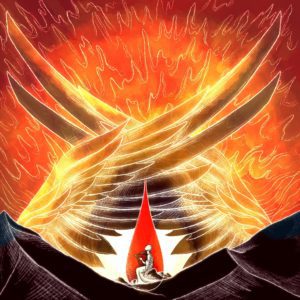 Ruth’s question, “Why have I found your favor?” is a good one for all of us to ask of God.
Ruth’s question, “Why have I found your favor?” is a good one for all of us to ask of God.
In Psalm 91:4, God invites to himself saying, “He that dwelleth in the secret place of the most High shall abide under the shadow of the Almighty. I will say of the Lord, He is my refuge and my fortress: my God; in him will I trust. Surely he shall deliver thee from the snare of the fowler, and from the noisome pestilence. He shall cover thee with his feathers, and under his wings shalt thou trust: his truth shall be thy shield and buckler.”
Later Jesus himself invited more lost souls to himself, the self-righteous Pharisees who saw God as their demanding employer and themselves as his dutiful employees, “O Jerusalem, Jerusalem, thou that killest the prophets, and stonest them which are sent unto thee, how often would I have gathered thy children together, even as a hen gathereth her chickens under her wings, and ye would not!” (Matthew 23:37)
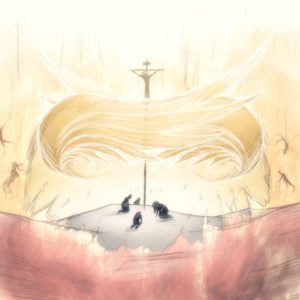 All the Pharisees had to do was to take refuge under the wings of Jesus. Stop justifying themselves. Stop relying on themselves. Stop glorifying themselves. But they wouldn’t.
All the Pharisees had to do was to take refuge under the wings of Jesus. Stop justifying themselves. Stop relying on themselves. Stop glorifying themselves. But they wouldn’t.
Don’t make the same mistake. Don’t follow the way of the Pharisee. Instead, follow Ruth.
Don’t find refuge in your contributions to God, in your culture, or the comfort of your family. Find your refuge in God and God alone.
Our Heavenly Father is like an eagle looking for eaglets who will take refuge under his wings. He is looking for people who will leave father and mother and homeland or anything else that may hold us back from a life of love under the wings of Jesus. Follow Ruth to our Redeemer. Run into his saving arms and there be wrapped in his garments of grace.
Other refuge have I none,
Hangs my helpless soul on Thee;
Leave, oh, leave me not alone,
Still support and comfort me.
All my trust on Thee is stayed,
All my help from Thee I bring;
Cover my defenseless head
With the shadow of Thy wing.
Jesus Lover of My Soul v. 2
[1] HT John Piper in his 1984 sermon, Ruth: Under His Wings
Questions to Consider
- What does Ruth's story lead me to confess about myself and my story?
- What does Ruth's story teach me about Jesus and my part in his story?
- What does Ruth's story and her place in his story lead me to pray about this week?
More Stories from Jesus' Family Tree
Are you anxious?
Free 4-Lesson Scripture Study
We are all carrying something. Weariness from the treadmill of life, isolation and loneliness from feeling like we don’t belong, anxiety over what might happen to us and those we love in the end, bitterness from failing to forgive, or tension from having forgiveness withheld from us.
Our FREE, Handbook for Healing scripture study identifies your pain, shares the cure and provides a treatment plan for living a life of freedom, forgiveness and peace can look like for you.
